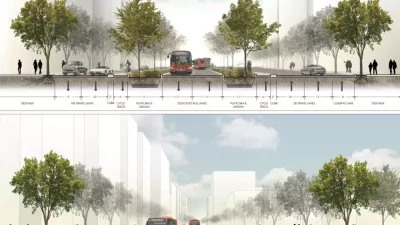Yes, planners have expertise to share, but according to this rather pointed critique, they also sometimes forget that other people do too.

Samuel Stein pens a scathing critique of the contemporary planning discussion, taking planners and other urbanists to task for "plansplaining," which is a riff on the term "mansplaining." Here, Stein defines the practice and identifies the practitioners:
From libertarian “market urbanist” types, we hear that that increasing the housing supply will drive down costs for everyone. From liberal “smart growth” advocates, we hear that including small numbers of quasi-affordable apartments in large scale developments is the best path towards integration and equity. Both sides, however, are telling residents: shut up. We’ve got this.
This is “plansplaining,” or the way planners talk down to residents as if they simply don’t understand the facts, when in reality those “facts” constitute their very lives. It’s the way some planners use their professional expertise as a cudgel against other forms of knowledge when those other perspectives go against prevailing orthodoxy, the politics of the day, or, most importantly, real estate profits.
So, yes: scathing. Stein's critique continues to comparisons of modernist city planners like Moses and Le Corbusier vis-à-vis Jane Jacobs, and calls for planners to head the wisdom of the people who know the city best.
There’s a reason working class New Yorkers get nervous when planners show up and promise big benefits from new development. For years, planners have been telling residents that stoking the market will somehow benefit them too—that allowing developers to build big, expensive, private buildings will translate into lower rents and higher quality of life. It never happens, and instead leads to gentrification and displacement. That’s why communities all over this city—the South Bronx, Chinatown, Long Island City, East New York, Staten Island’s North Shore and beyond—are up in arms about rezonings.
Stein's conclusion calls on planners not to abandon their work and keep their mouths, but "they must drop the presumption that they can explain the city to those who know it intimately."
FULL STORY: As They Rally Around Rezonings, Planners Often ‘Plansplain’

Maui's Vacation Rental Debate Turns Ugly
Verbal attacks, misinformation campaigns and fistfights plague a high-stakes debate to convert thousands of vacation rentals into long-term housing.

Planetizen Federal Action Tracker
A weekly monitor of how Trump’s orders and actions are impacting planners and planning in America.

San Francisco Suspends Traffic Calming Amidst Record Deaths
Citing “a challenging fiscal landscape,” the city will cease the program on the heels of 42 traffic deaths, including 24 pedestrians.

Defunct Pittsburgh Power Plant to Become Residential Tower
A decommissioned steam heat plant will be redeveloped into almost 100 affordable housing units.

Trump Prompts Restructuring of Transportation Research Board in “Unprecedented Overreach”
The TRB has eliminated more than half of its committees including those focused on climate, equity, and cities.

Amtrak Rolls Out New Orleans to Alabama “Mardi Gras” Train
The new service will operate morning and evening departures between Mobile and New Orleans.
Urban Design for Planners 1: Software Tools
This six-course series explores essential urban design concepts using open source software and equips planners with the tools they need to participate fully in the urban design process.
Planning for Universal Design
Learn the tools for implementing Universal Design in planning regulations.
Heyer Gruel & Associates PA
JM Goldson LLC
Custer County Colorado
City of Camden Redevelopment Agency
City of Astoria
Transportation Research & Education Center (TREC) at Portland State University
Jefferson Parish Government
Camden Redevelopment Agency
City of Claremont





























